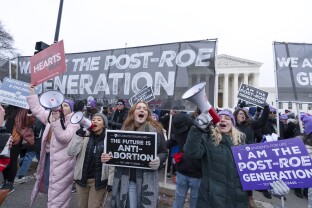A state-level initiative that would protect abortion rights in Arizona cleared a legal challenge this week, guaranteeing its place on the ballot in a key state for both the presidential race and the Senate.
Anti-abortion advocates are still putting up a campaign against it, but they’re facing long odds on a policy fight that has grown increasingly favorable for Democrats. Polling shows voters in the state are supportive of abortion access, and their campaign differs little from how anti-abortion strategists in other states have tried and failed to convince voters to defeat similar measures.
“What’s that quote, like insanity is doing the same thing over and over again and expecting a different result? It’s like that,” an activist who is working against the initiative told NOTUS, expressing frustration with anti-abortion efforts in Arizona and other states where these ballot measures have cropped up. She spoke to NOTUS candidly on the condition of anonymity. “Clearly, what we’ve been doing isn’t working.”
So far, voters have sided with abortion access in every state-level initiative since the Dobbs v. Jackson Women’s Health Organization ruling in 2022 overturned the federal right to an abortion. That includes red states like Kentucky and Kansas.
These state-level efforts have become a salve for abortion access advocates as abortion bans have come up across much of the U.S., restricting access for millions of women. While most of the campaigns around these ballot questions have tried to appeal to voters of all political persuasions, Democrats up and down the ballot have made a point of closely associating themselves with them as abortion access has become a winning issue.
Anti-abortion advocates have made light of these losses, pointing out that not all states can amend their constitutions through a ballot initiative, and arguing that soon abortion access advocates will exhaust it as an option.
When asked twice what makes Arizona’s anti-abortion strategy different from campaigns in other states, Cindy Dahlgren, spokesperson for the official campaign against the initiative It Goes Too Far, pointed only to other similar ballot initiatives.
“Arizona voters have the advantage of seeing the consequences of these types of amendments passed in other states,” Dahlgren said. “They’re already losing common sense safety precautions for girls and women who do get abortions.”
Two Republican consultants told NOTUS that opponents are not using Arizona as a testing ground for new strategies to defeat abortion ballot initiatives.
“Are they doing anything? I don’t really see an active campaign from them,” Barrett Marson, an Arizona-based GOP consultant, told NOTUS.
Doug Cole, a longtime Republican political consultant in Phoenix, said that anti-abortion advocates were relying on confusion to help make their case.
“The signs say protect women’s health, vote no,” Cole said of the signs advocating against the amendment that he’s seen around Phoenix. “Someone can ponder to themselves and say: ‘Wait a minute, I thought this allows women to make their own medical choices, doesn’t that protect women’s health?’”
Numerous polls indicate restrictive abortion measures are not politically popular in Arizona. In a survey released last week by the Kaiser Family Foundation, 70% of child-bearing-aged women in Arizona said they believed that abortion should be legally obtainable in all or most cases.
Proponents of the amendment, known as Prop. 139, also do not see any difference in their opponent’s strategy from what’s happened in other states. “I don’t see them doing anything differently,” Athena Salman, director of Arizona campaigns for Reproductive Freedom For All, told NOTUS. “Their end goal is to ban abortion, which is incredibly unpopular.”
In the meantime, abortion providers like Gabrielle Goodrick, medical director of Camelback Family Planning in Phoenix, are hoping the amendment passes to avoid a constantly-shifting legal environment for their work.
“Having something in our Constitution that is immune to the political whims of the legislature, and the governor, and the attorney general … is the most important thing,” Goodrick told NOTUS.
—
Tara Kavaler is a NOTUS reporter and an Allbritton Journalism Institute fellow.
Sign in
Log into your free account with your email. Don’t have one?
Check your email for a one-time code.
We sent a 4-digit code to . Enter the pin to confirm your account.
New code will be available in 1:00
Let’s try this again.
We encountered an error with the passcode sent to . Please reenter your email.


